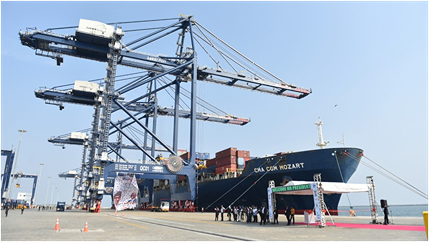The Nigerian Maritime Administration and Safety Agency (NIMASA), the Nigerian Ports Authority (NPA), and other government entities operating in the maritime sector, according to the Federal Inland Revenue Service (FIRS), fail to effectively enforce the relevant laws, allowing the majority of mainstream shipping companies that refuse to comply with their tax obligations to get away with their behavior.
This was said by Olarinde Olufemi, the Technical Assistant to the Executive Chairman of FIRS, during a courtesy visit by the FIRS team to The Guardian’s head office in Lagos.
International shipping line operators in the nation had been warned by FIRS to either regularize their tax affairs with the tax authority by December 31, 2023, or face penalties.
The tax body said that several international shipping companies have refused to comply with the tax obligation imposed since December 2021 in a public notification made on its Twitter account on Monday.
The FIRS circular no. 2021/14, issued June 3, 2021, on the taxation of international shipping and aviation, and the public notice from December 17, 2021, on the tax compliance of international shipping lines, were both referenced in the public notice signed by Muhammad Nami, Executive Chairman of FIRS.
The FIRS requested that all impacted foreign shipping firms, including operators of Floating Production Storage and Offloading (FPSO) vessels, dredgers, survey, containerized, bulk cargo, fishing trawlers, crude oil or natural gas lifting vessels, and other vessels, immediately regularize their tax positions by December 31, 2023.
After the grace period has passed, the tax authority said it will work with relevant government regulatory and security organizations in the marine industry to start taking enforcement action against all defaulting shipping businesses.
Olufemi went on to say that in order for anyone to conduct business in the marine industry, government entities are required to request a tax clearance certificate.
According to him, if certain requirements are met, every company other than a Nigerian company must pay tax under section 13(2) of the country’s tax code.
He claims that the requirements include that the businesses have a stable basis, a sizable economic presence, and revenue from contracts in Nigeria.
He said that Section 14 particularly addresses businesses engaged in international transportation, which are subject to taxation if they generate profits from transporting products and people out of the nation.
“What we have seen over the years is that the airlines pay because we can easily see them. The mainstream shipping companies pay, but the ones we have issues with are the tankers, those that lift crude. FIRS cannot be on the high sea to enforce.”
“The problem we have is the issue of enforcement because probably some other government agencies, whether they didn’t understand that fact or something. FIRS in 2021 released a circular just to intimate that sector that these are the obligations they were supposed to fulfill and we did that trying to enforce,” he said.
Olufemi revealed that enforcement has been constituted an offense by the regulatory organizations and is part of the Finance Act of 2023.
“The maritime agencies must demand a tax clearance certificate before anyone can do business in that sector. Either you come new or continue the business, the agencies must demand a tax clearance certificate.”
“Any international shipping companies that want to do business here must approach FIRS to get a tax clearance certificate before NIMASA, NPA or what have you, give them clearance to operate,” he said.



